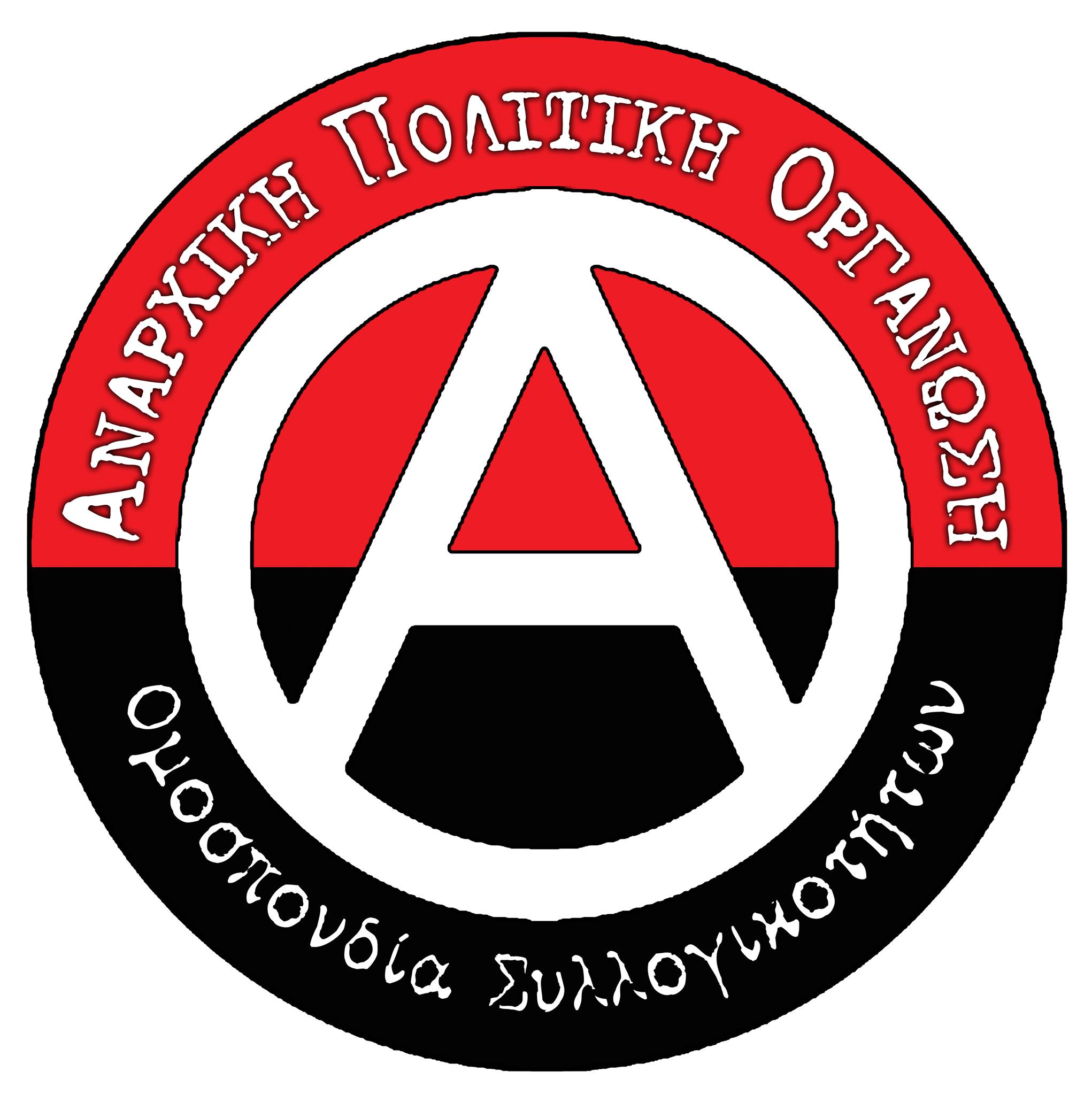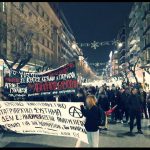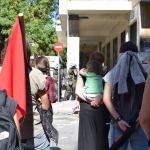Beloved comrades zapatistas women,
Beloved women fighting all over the world
At the first international women’s meeting, in the revolted zapatist territory in March 2018, we made some promises. First, we promised to stay alive, which meant to keep fighting, not closing our eyes, not keeping quiet. We have succeeded in this. We made another promise: to take all those things that we heard and learned at that meeting as far as possible, not just to keep them for ourselves; to share them with the comrades and the partners, to say in how many ways the world is bigger than we sometimes think, but it’s also a common, a collective one, and how in all the things which we think, in what we dream, what we’re anxious about, we’re not alone. And we did this as much as we could, with events in many cities here in Greece, with translations, texts, speeches, events, discussions. And a year later, at the March 8, 2019 protests, we were outside the embassy of Mexico and outside the parliament in Athens, on the streets of Thessaloniki and Patras, we lit smoke signals that symbolize the spark we promised to carry and shouted “In Greece, Mexico, Rojava and Turkey, women’s struggle for freedom”.
But we also promised one more thing. We cannot keep to that and we want to say why: We promised we’d come back and we’d be more of us, no matter how far away, and even if two of us were deported last time, we’d come back. But what’s happening here now, in this part of the world we live in, doesn’t allow us to.
Since the summer, a widespread repressive campaign has been underway against the anarchist movement, the squats, the self-organized structures for housing refugees and migrants, the world of solidarity, against the social and class resistances. A campaign which is the spearhead of the attack by the state and the bosses on the grassroots of society, aimed at terrorizing and disciplining them, for the unhindered attack of state and capitalist barbarity. The purpose of the audacious state violence and ideological media propaganda accompanying it, is on the one hand to take the rematch for the social uprisings that preceded it, as in December 2008 after the police assassinated 15-year-old Alexis Grigoropoulos. To strike at Exarcheia neighborhood, which is a permanent barricade against the plans of the authority, to abolish the university asylum that functions over time as a meeting point for the fighting people and to evacuate the squats that represent the epicenter of social-class self-organization, resistance and solidarity. Through these strikes, however, the State mainly wants to uproot the reference points and the current timeliness of the revolutionary props, to stem tomorrow’s riots; the riots that are being carried within a reality, where the bankrupt system has nothing to promise but misery and fear, the brutal looting of societies and nature.
Since the summer, the state has been attacking the squats and it has evacuated dozens of sites. Some of these are squats which house refugees and immigrant women, women, children and men, coming from war zones, from Syria, from Afghanistan, from Iraq, from countries in Africa, people who have managed to cross the bloody border of Fortress Europe. In dawn, armored police officers enter the buildings, which solidarity has turned into self-organized areas of life, and arrest people, piles them in police vans, and takes them to concentration camps, where they are intended to be locked up, behind barbed wire, in appalling conditions and where very often lurks death. Recently Taryye Faryk from Afghanistan died in Moria camp, surrounded by flames, and a baby sleeping in a cardboard box was killed under the wheels of a truck. Refugee children who lived in the squats are forcefully removed from the schools they attended, their toys are thrown in trash by the police and municipal employees, the women and men who lived there are once again uprooted to become invisible.
At the line of the state’s fire are the anarchist political and housing squats, where people live and grow collectively, against the norm of property and the extermination for the poor of rent blackmail. Spaces hosting collectives and assemblies that compete with the world of domination, places where solidarity and social intervention are born, against mediation and resignation. That is why they have been subjected to repeated inflammatory and murderous attacks by fascist partisan gangs with police coverage, and that is why the state wants to eliminate them. At the moment, the Ministry of Public Order has issued an ultimatum to abandon our spaces, with the threat that the police will invade, that we will be arrested and tried. But we’re not leaving. We have said that in the face of state repression there will be no tradition and no truce.
For such a space, one of our squats in Athens, we want to tell you a story: We once hosted an indigenous comrade from Chiapas who came to our city to tell us about women’s struggles. And we looked at her with great respect, recognizing the hard conditions in which you struggle and fight, and thinking that here it may be easier. But at that time, when we were eating together at the squat, she seemed very moved, and maybe a little sad for us. So, she told us that she sees how hard it is to live in this city, because we don’t have land, we have nothing, the poor have nothing, and in order to find the food we share we have to go work for the bosses. And there are no autonomous schools, no laboratories, no communities. And she looked with appreciation at this building that we’ve occupied, the posters on the walls and the spaces that we’ve built together, and she said that she sees that this is our own autonomy in “such difficult conditions.” We don’t give these spaces away, because this is our operating bases, our communities. We defend them, fighting not only for those spaces but for what they represent: the ability of people to live without power and exploitation, the possibility of a society without political and economic bosses, without prisons, camps and borders. So, we do this by staying up at night and getting ready, knowing that by the time the light grows, every day, helicopters and the police army could come. That is why we are holding meetings and protests. And we organize events that we talk and meet with other men and women, make suggestions, write and make plans. And we are inspired by the indigenous women of Chiapas who are bent on the Mexican army that invaded their communities with their bare hands. From the women of Oaxaca, from the little Palestinians, from the Mapuche women, from the women in Rojava, from all the women we met at the previous meeting, from the women in Chile who defy police terrorism, in Brazil, in Ecuador.
We must also tell you that, as part of this repressive campaign, entire areas are under constant police occupation. In the neighborhood of Exarheia, in Athens, riot platoons have been installed on a permanent basis, terrorizing residents and engaging in sexist threats and attacks on girls and women who live and move around the area. Platoons march as intruders and occupants on the streets, outside homes, cafes and venues, polluting our days and nights with the sound of their boots and radio, imposing the militarization of daily life. Sexual harassment is a methodical practice and a tool for consolidating this treaty. On our way home, work or school, when we are going to assemblies or just walking, an attempt is being made to impose a treaty where we are obliged to pass in front of uniformed thugs to supervise our movements, to comment on our looks, to abuse in a sexist way, to move towards us, to monitor our paths, to intimidate and frighten us. At the same time, they attack those who are resisting state repression, using sexist violence methodically as a means of humiliation and discipline. A violence that seeks to punish and bring up women who, as such, have chosen to rise up. Their sexist and homophobic attacks on women and men, including the practice of undressing detainees and beating them naked even in public, carrying out virtual rapes against demonstrators, attempting in every way to attack the dignity and physical integrity of the combatants, are tools in the attempt to dominate the state, para-state, capitalist and patriarchal brutality.
What we’ve known for so long, most people see now: Patriarchal sexist violence is not a phenomenon that originates spontaneously but is promoted, practiced and legitimized institutionally. Rape, murder, abuse of women, trafficking, their vindication by the judiciary and the incrimination of the “victims” are part of social cannibalism, part of the sovereignty and division of the social body. It is institutional violence on the social body. And institutional violence is not a deviation from the mismanagement of power. It is a systemic tool, to terrorize the population, so that no one dares to resist. And we see even official entities that want to talk about “gender-based violence” keep silent about police violence in struggling women, keep silent about women’s sexist practices of discipline, keep silent about the sexist attacks on men and women protesters, intended to humiliate them.
That’s why we’re here standing before them and as women we are, like when we made our own block and lined up in front of them, with flags in our hands and handkerchiefs in our faces. That is why we believe it is important that these practices of power should be denounced and not hidden away. And we know that that’s not enough, the complaint, that we’re not fighting to decorate and humanize brutality, but to overturn it. As you write: To be free of this system, of which patriarchal gender violence is a means of reproducing, we must destroy it.
But that’s why we have to be here right now. Because all that’s going on has a lot of demands and a lot of work, and we can’t let men make ends meet on their own. Because sometimes when we’re locked up in cells, we’re the ones who start the song and sometimes we get together more easily to write an announcement. Because when the kids are protesting from the refugee squat and they pass by the platoons, we want to hold their hands. And at the marches, some of us have very, very loud and beautiful voices and they start slogans, and without them, we don’t know how the streets would resonate. And because the police, who want us to be fearful as women, not to be in the squats, assemblies and marches, we don’t want them to be encouraged by seeing that we’re gone. Of course, all this is an exaggeration because we would not all come, but only a few. But it’ s also that we don’t want to leave each other right now.
That is why we want you to know that we ostensibly did not keep a promise, and this time we were unable to get there. But we kept the great promise we made, to fight together, to connect our struggles, even when we don’t see and touch each other. We send our warmest greetings to the zapatistas women, to all the zapatistas communities that will celebrate 26 years of uprising on New Year’s Day and to all women who are fighting against state, capitalist and patriarchal violence.
Group against patriarchy – Anarchist Political Organization –Federation of Collectives-
28 December 2019, Greece







![[Θεσ/νίκη] Τυπώθηκε και κυκλοφορεί το τρίτο τεύχος της αντιπατριαρχικης περιοδικής έκδοσης “Ελεύθερες Γυναίκες”](https://apo.squathost.com/wp-content/uploads/2025/10/eleutheres-teyxos-3-218x150.jpg)
![[Αφίσα] Συγκέντρωση αλληλεγγύης στην Ε. | 10/6, Εφετείο](https://apo.squathost.com/wp-content/uploads/2025/06/e_ilioupoli_10-6-25-218x150.png)
![[Αθήνα] Συγκέντρωση την ημέρα έναρξης της δίκης των μπάτσων βιαστών από το ΑΤ Ομόνοιας | Τετ. 7/5](https://apo.squathost.com/wp-content/uploads/2025/05/atOmonoias1-218x150.png)
![[Αφίσα] Γενική απεργία 28 Φλεβάρη | Τέμπη, Πύλος, Χίος, Βιολάντα – Κράτος & Κεφάλαιο δολοφονούν](https://apo.squathost.com/wp-content/uploads/2026/02/apo_28-2-26-324x160.jpg)